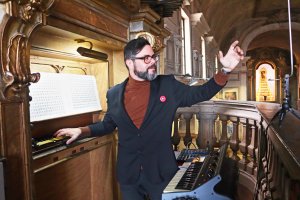Temptations
The triptych Tentações de Santo Antão (Temptation of Saint Anthony) is an oil painting on wood panels from the XVI century by the Netherlandish painter Hieronymus Bosch (1450-1516). The painting portraits the physical, mental and spiritual torments endured by S. Anthony the Great, a common subject in Medieval and Renaissance art. Like in other Bosch’s works, this triptych uses a unique and fantastic imagery. The painting hangs in the Museu Nacional de Arte Antiga in Lisbon and since my childhood is one of the places I often visit, just to admire this painting. In each visit new details arise and fascinated me into creating an ‘orquestre diabolique’ to portrait the scene.
The most recurrent and central theme: the temptations and solitude of the just man in the face of evil. On the inner sides, the triptych shows three steps from the hagiography of Saint Anthony, tempted and seduced by demons until he finds the way to salvation through the hermitage experience. On the outer faces, visible with the closed triptych, the situation it normally found itself in, are popular and non-demonic figures who stir up and disturb the path of Christ from Prison to Calvary; their monochrome helps to create a strange and moonlit atmosphere, which underlines the desolation of the landscape and accentuates the disturbing certainty of a widespread domination of evil.
This triptych integrates the four elements of the universe (air, earth, water and fire) making them the setting for horrendous characters. The elements are correlated to the family of instruments (woodwinds, percussion, strings and brass). The sounds of the orchestra where use, in particular the extended techniques, tremolos and glissandi. Varied percussive sounds of the instruments are added and transformed mixed with the usual percussive instrument, snares, toms, cymbals and timpani. In the form and structure there are repetitions, mimicking the continuous temptations. Each sound is manipulated and transformed into something just a little bit artificial, eluding the listener if these sounds where played like that or manipulated afterwards. Like the devils playing with St. Anthony. Temptations are often illusions by one self or imposed by society or religion, so the spacialization, pitch and time transformations are added to keep that ambiguity and creating an immersive narrative. Several rebound, fluxus and oscillation movements are used throughout the piece, representing each temptation, that abruptly try to corrupt St. Anthony’s will. Throughout the piece some sounds indicate the anguish and torment with some false release. It raises the question if it is possible to resist a constant pressure of temptations, like in our modern society, and if St. Anthony (or us) will resist them.
This piece was awarded as a Finalist in the 11th Biennial Acousmatic Composition Competition Métamorphoses 2020, Ohain (Belgium) performed in Brussels by Annette Vande Gorne.
